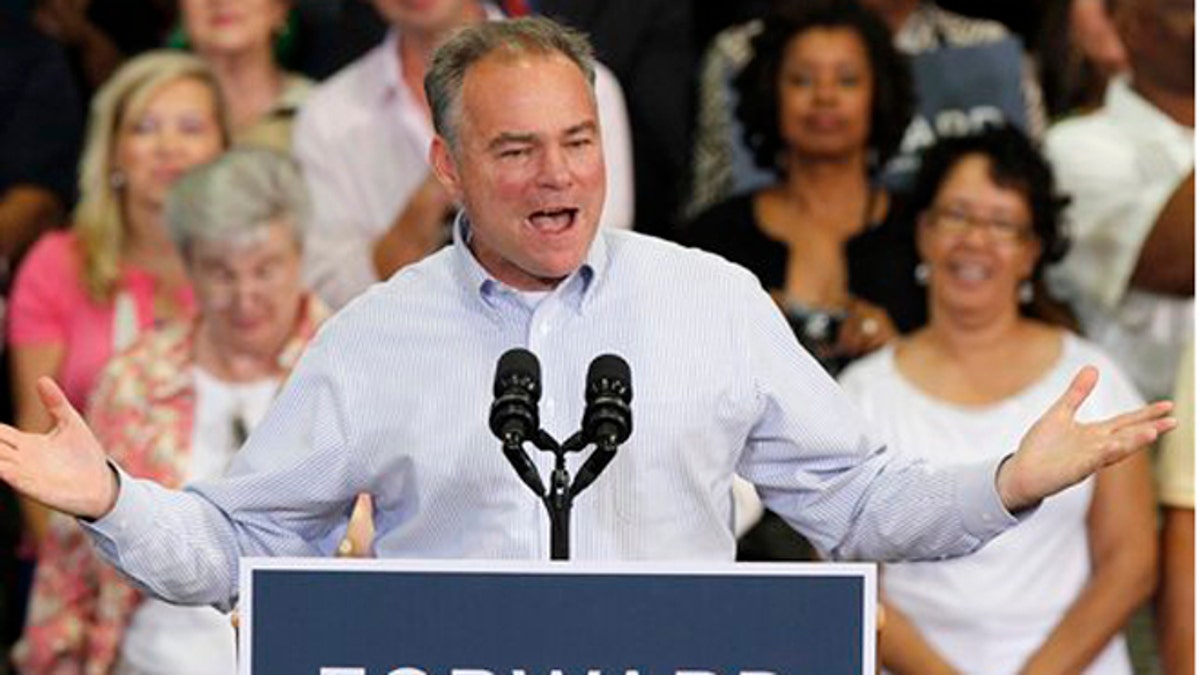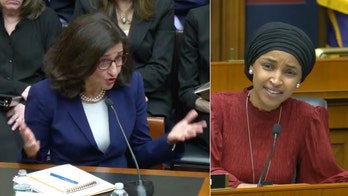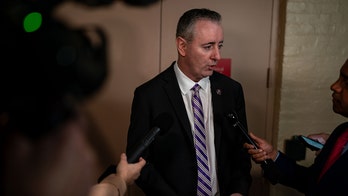
July 13, 2012: Virginia Democratic Senate candidate Timothy Kaine gestures during a campaign stop for President Obama in Virginia Beach, Va. (AP)
HOT SPRINGS, Va. – Democrat Tim Kaine and Republican George Allen had their first debate Saturday for the open seat of retiring Democratic Sen. Jim Webb, in one the closes races of the 2012 election season in the hotly contested swing state of Virginia.
The two former governors in a campaign that also could determine partisan control of the Senate clashed in a 75-minute exchange before several hundred lawyers at the posh Homestead resort for the annual Virginia Bar Association's summer retreat.
Allen, running to reclaim the Senate seat he lost to Democrat Webb in 2006, hit Kaine on his support for federal spending cuts that could be ordered under a compromise the White House and House Republicans reached last summer for raising the limit on federal borrowing.
National defense could suffer $500 billion in cuts, and Virginia, home to the Pentagon and the world's largest Navy base in Norfolk, would suffer more than 200,000 job losses, Allen said.
"The result? Disproportionate defense cuts that would be disproportionate to Virginia's economy and our military," he said, pressing Kaine to defend the compromise -- a deal that also had the blessing of Republican House Majority Leader Eric Cantor of Virginia.
Kaine struck back, calling Allen a profligate spender during his term as governor from 1994-1998, when the state's budget grew by 45 percent, and in a GOP-ruled Congress that quickly converted former President Bill Clinton's budget surpluses into trillions in federal deficits.
"He voted for two wars (Afghanistan and Iraq) without any concern about how we would pay for it. He voted for expensive tax cuts, not caring how we would pay for it," Kaine said. Turning toward Allen, he added, "You talk like a fiscal conservative, but you never governed like one."
Allen countered that by the time he left the Senate after 2006, the government was "on a trajectory toward a balanced budget." He said he was in a minority of 15 senators who opposed Alaska's "bridge to nowhere," one of the most infamous federal earmarks to win congressional approval during Allen's Senate tenure.
Early in the debate, Allen and Kaine sketched a few clear policy distinctions. Kaine said he favored a blend of cuts and revenue for reducing federal deficits -- $3 in spending reductions for every $1 of new taxes. Allen rejected any additional taxes, not even at a ratio of $10 in cuts for every $1 of higher taxes.
Kaine said he would allow tax cuts that President George W. Bush put in place to expire on those who earn $500,000 or more a year, double the threshold Obama set. Allen called it a massive tax increase and called for keeping the cuts in place at every income level.
For a moment, there was even partisan harmony. Both voiced sorrow and outrage at Friday's movie theater massacre in Aurora, Colo., and advocated better background checks to keep firearms out of the hands of criminals and the mentally ill. Allen even praised Kaine's handling as governor of the worst mass shooting in U.S. history at Virginia Tech in April 2007.
By the final third of the debate, however, the dialogue became much more acerbic, partisan and personal.
Republicans have sought to handcuff Kaine to Obama and his liberal policies. Allen accurately called Kaine Obama's hand-picked DNC chairman, but then rankled Kaine by saying he is, "in effect (Obama's) hand-picked senator, recruited to run for the Senate."
Kaine interrupted Allen.
"I am highly offended at that. I am campaigning full-time for 19 months with the support of my family. For you to say I am hand-picked by somebody else rather than doing it myself is completely out of line," Kaine said.
Allen, who courted his party's conservative base in the primary, has sought to soften his partisan image since winning the nomination in June.
So Kaine confronted Allen on his support for an anti-abortion measure that would extend the legal rights of personhood to human embryos from the moment of conception. Critics of "personhood" legislation say it would not only end abortion rights should the Supreme Court's 1973 Roe v. Wade ruling be overturned, it could also deny women certain forms of birth control.
"Why would you claim to be a small-government guy and propose what would be such a dramatic reach into people's personal lives and moral decisions?" Kaine asked.
Having stumbled over the same question in a December one-on-one debate with Kaine, Allen explained that his proposal is not intended to interfere with contraception.
"It's about protecting an unborn child and its mother," he said. It would hold attackers criminally accountable for assaults on women that kill or injure her fetus, no matter its gestational age.




